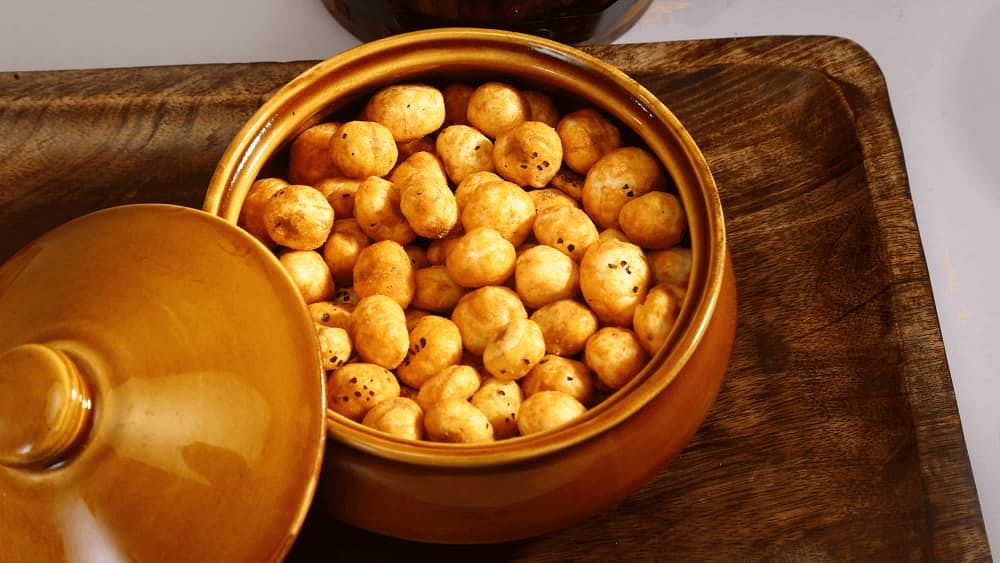Makhana is commonly used to make Indian snacks and sweets such as kheer, raita, or makhana curry. They are usually eaten as an evening snack as well. People living in different parts of the country use makhana as an offering to the Gods during Navratri and other auspicious events.
What Is Makhana (Lotus Seeds)?
For those wondering what is makhana, they are a part of the lotus flower. Yes, this beautiful flower offers more than just its beauty. They are also called fox nuts, Phool makhana, Euryale Ferox, gorgon nuts, and lotus seeds. After processing the lotus seeds, they become highly nutritious.
Makhana Calories
Let’s look at makhana calories in 100g of Makhana:
Makhana Nutrition
According to the nutrient profile of makhana, we can understand makhana nutrition. It has high levels of fibre and a low glycaemic index, low calories, and fat. Makhana also has great magnesium levels, which help boost the metabolism and contribute to muscle function, nerve function, and protein production.
The carbohydrate content offers great energy to the consumer. It is rich in calcium and iron, which helps maintain healthy bones, teeth, and blood. Makhana has a lot to offer in terms of health benefits, particularly if you have deficiencies.
Makhanas Benefits
We hope that the following Makhanas Benefits will be exciting enough for you to add to your diet. Here are the best lotus seeds benefits:
1. Makhana Benefits for Skin
Makhana is rich in antioxidants that eliminate free radicals from your skin, making you look youthful. You will see makhana benefits for skin if you eat them daily. However, ensure that you do not fry the makhana.
2. Makhana Benefits for Hair
The makhana benefits for hair include hydrating them. Makhana is an excellent conditioner that can help you get shiny and bouncy hair. It can even help you get rid of split ends. This is because makhana has flavonoids that repair tissue, heal wounds, and prevent inflammation.
3. Makhana Benefits in Pregnancy
There are some makhana benefits in pregnancy, such as controlling blood sugar levels. During pregnancy, stress and hormones can easily contribute to rising sugar levels. However, since makhana is rich in Vitamin B complexes and fibre, it can help control high blood sugar levels by lowering glucose levels in your blood.
4. Makhana Benefits for Male
Many men face impotence and don’t know what they can do to improve their situation. One of the makhana benefits for male includes overcoming impotence. Men may be unable to perform due to blood pressure, blood sugar, or stress. However, makhana can help counter those issues owing to its fibre and vitamin content.
5. Makhana Benefits for Female
Since makhana has a cold taasir, they help balance the body’s aggravated fire and air elements. The makhana benefits for female include neutralising acidic conditions such as gastritis and easing bleeding such problems as nasal bleeds and the menstrual cycle.
6. Makhana Benefits for Babies
Makhana is loaded with calcium which contributes to the development of the baby’s teeth and bones. Moreover, lotus seeds happen to be gluten-free, making them a safe food for babies. It is unlikely to cause an allergic reaction. Moreover, since they are rich in antioxidants, it helps protect your baby from infections and health conditions and maintain good health. Overall, there are many makhana benefits for babies.
7. Makhana Benefits for Weight Loss
There are multiple makhana benefits for weight loss. Since makhana is rich in potassium and magnesium and low in sodium, it is perfect for those trying to lose weight. They also have a high level of protein which helps in muscle toning. The high fibre content improves metabolism and digestion, contributing to maintaining a good weight. It also helps to keep you feeling full for longer. Therefore, makhanas are often eaten during fasting periods. It also improves your digestion, helps you avoid constipation and adds bulk to your stool. You need not eat snacks with preservatives and additives when you can eat a bowl of makhana that will keep you full for a long time.
8. Makhana for Heart Patients
Makhana contains gallic acid, chlorogenic acid, and epicatechin, which are beneficial to our bodies. They help reduce the risk of heart disease, certain cancers, and chronic conditions such as diabetes. Makhana for heart patients is great because it is low in sodium, cholesterol, and saturated fats. This helps to keep your heart healthy.
9. Makhana for Diabetes
You can eat makhana for diabetes as they contain good fat and don’t have too many saturated fats. Since they have a low glycaemic index, they slowly release glucose into the blood. This helps maintain energy throughout the day. It also helps keep you feeling full for longer.
10. Makhana for Detoxifying
Makhana helps to flush out toxins in your body. It also helps recycle red blood cells in your spleen. This is important because your spleen is the nerve centre of the immune system, where white blood cells and platelets are stored.
11. Makhana for Allergies
For those who have celiac disease, wheat allergies or gluten intolerances, makhana is a great snack choice. Not only is it gluten-free, but it also has high protein and carbohydrate content.
12. Makhana for Hypertension
Those suffering from hypertension can benefit from eating makhana due to its high potassium and low sodium levels. Potassium helps to bring down the blood pressure, and sodium can bring it up. Hence, it helps those suffering from high blood pressure levels to maintain a good blood pressure level with no spikes.
13. Makhana for Inflammation
Inflammation causes many contemporary diseases such as arthritis, diabetes, and rheumatism. Makhana contains kaempferol, a natural compound that reduces inflammation in your body. It also has antibacterial properties that help heal such diseases.
14. Makhana for Bone Health
Makhana has high calcium content, beneficial for your teeth and bone health. Eating one serving a day could fulfil your body’s calcium requirement for the day.
15. Makhana for Cognitive Function
Since makhana has high thiamine content, it aids cognitive function. It also encourages the production of acetylcholine in the body that contributes to the process of neurotransmission. This is necessary for our nerves to function well.
16. Makhana for Kidney Issues
Fox nuts possess astringent properties which help people with weak kidneys. The anti-inflammatory and antioxidant properties help reduce inflammation and oxidative stress, making it easier to manage kidney issues.
17. Makhana for Mental Health
Lifestyle changes have contributed to an increasing level of mental health issues such as insomnia, anxiety, and depression. Consistent sleep deprivation can lead to declining health and lowered cognitive ability, which affects our productivity. Before you turn to store-bought solutions, you can try natural solutions such as dietary changes.
Adding makhana to your diet can help insomnia. All you need to do is brew the makhana with some milk and dates. Soak a few dates and the makhana in water for a few hours. Drain the water and put all the ingredients, including milk, in a blender. You will get a smoothie which you can drink before sleeping. If you wish for it to be sweet, you can add a little honey. To notice the benefits of makhana with milk, you will need to consume it for a few days.
Also Read: What Are Chyawanprash Benefits, Uses, Dosage, Side Effects & More
How to Make Roasted Makhana
It is quite easy to make roasted makhana at home. It makes for a great snack, especially at teatime. This is how to make makhana the roasted way:
Ingredients
- 3 cups of makhana
- ¼ teaspoon of turmeric powder
- ½ teaspoon of red chilli powder
- 1 teaspoon of chaat masala powder
- Rock salt (according to taste)
- 2-3 teaspoons of oil or ghee
Instructions
- Heat the oil in a pan
- Put the makhana in and roast it for 10-12 minutes on low heat. It should become crisp. Keep stirring every now and then.
- Put in the spices and rock salt. Save chaat masala for later.
- Switch off the heat as it can burn the spice powders.
- Stir all the ingredients together.
- End with sprinkling the chaat masala powder on top. Mix it one last time.
- You can serve it immediately.
- Once it cools down, store it in an air-tight container.
How to Eat Makhana
There are different ways to consume makhana. We will offer some suggestions that might work for you. This is how to eat makhana:
1. Makhana
Take a couple of handfuls of makhana and eat it plain. You can also add it to a salad.
2. Roasted Makhana
You can roast makhanas on a pan. Once they are crispy, you can take them off the fire. You can season it with different spices or masalas such as salt, pepper, chilli powder, chaat masala powder, etc. You can eat 2-3 handfuls of roasted makhanas or add them to your salad.
3. Makhana Flour
Put 2-3 cups of makhana in a blender and grind it to powder. Take ½ cup of that powder in a bowl and slowly pour in hot water. Keep mixing the concoction with a whisk or spoon. There must be no lumps in it. Add ghee towards the end and mix it well. Let it cool down. Before you eat it, you can add in a dash of honey.
Makhana Side Effects
There could be some makhana side effects like everything else we consume if eaten in excess. Watch how much you eat and moderate your makhana consumption. Else, you might have the following side effects of fox nuts:
- While makhana is gluten-free, you might be allergic to some other compound in it. Excessive consumption might result in gastrointestinal problems and increased insulin levels.
- Excessive intake might also result in constipation and bloating.
If you feel odd after eating makhana or show any allergy symptoms, stop consuming makhana immediately. Diabetic patients and pregnant women should consult their doctor before making dietary changes. If you are on medication for chronic illnesses, consult your doctor before adding makhana to your diet. However, makhana will barely have any side effects compared to the range of health benefits they offer.
Summing Up on Makhanas Benefits
Makhana is the perfect snack choice. It is both satisfying and healthy. There are different ways in which you can prepare and consume it. It has so many health benefits, and it is yummy too. Add a bowl of these yummy crunchy fox nuts to your daily diet. You will be doing yourself a favour.
FAQs
Let’s look at a few more questions related to makhanas.
Can We Eat Makhana Daily?
Yes, you can eat makhana in moderation daily.
Which Time Is Best for Eating Makhana?
Considering its calorie count, you can eat this snack at any point of the day. It is a perfect morning and evening snack.
Is Makhana Hot or Cold?
According to Ayurveda, makhana has a ‘madhura’ (sweet) rasa post digestion. It has what is called ‘sheeta veerya’ or cold potency. Makhana is ‘guru’ or heavy in nature and ‘snigdha’ or oily. Ayurveda claims that the ‘vrushya’ element of makhana improved vigour, its ‘balya’ element promotes strength and immunity, its ‘grahi’ elements improve your stool, and its ‘garba samsthapaka’ element encourages safe pregnancy. Makhana is said to balance vata and pitta dosha.
How Many Makhana Eat a Day?
You can consume 2-3 handfuls of makhana in a day.
Does Makhana Expire?
Yes, it has a shelf life of 6 months. Store it in a cool and dry place.












